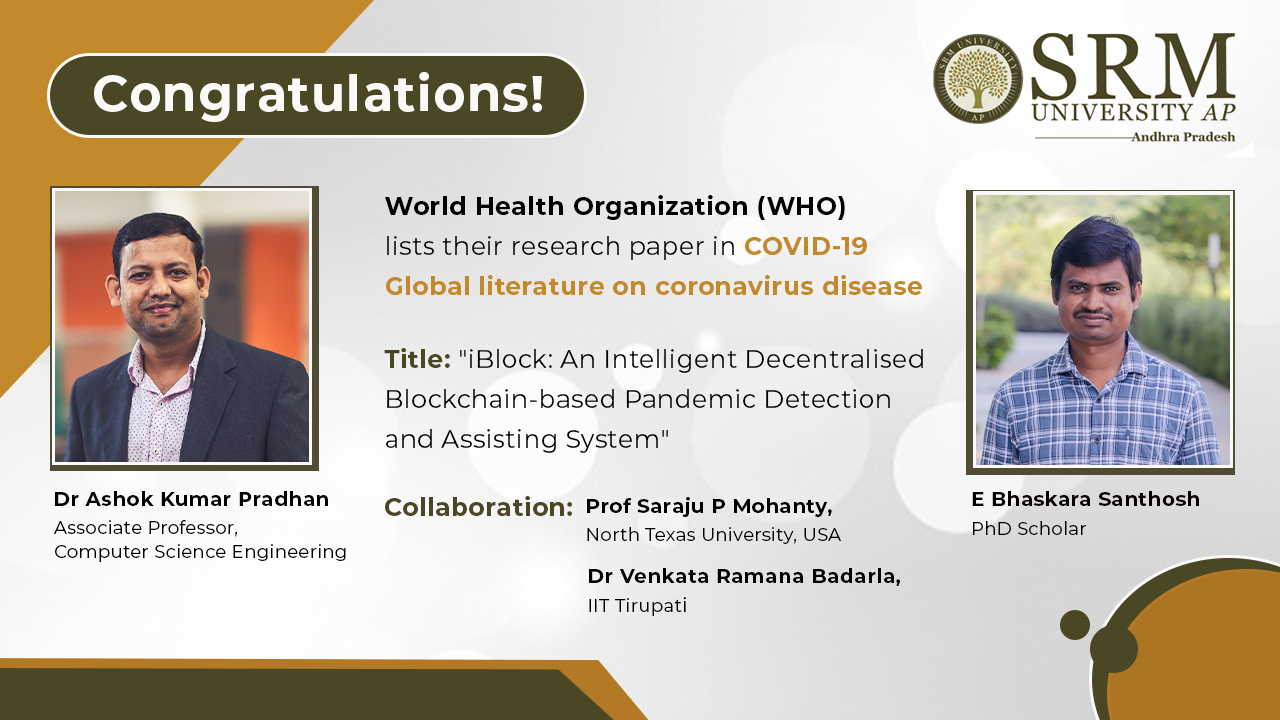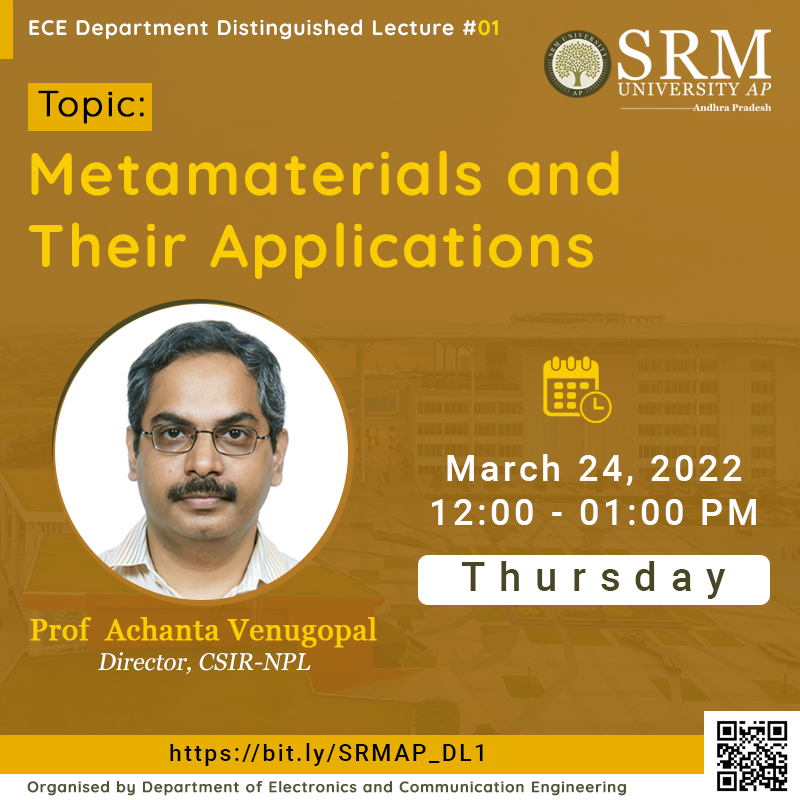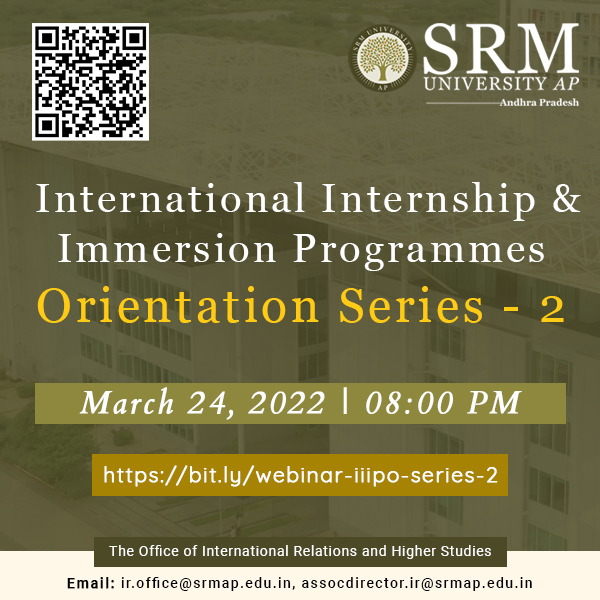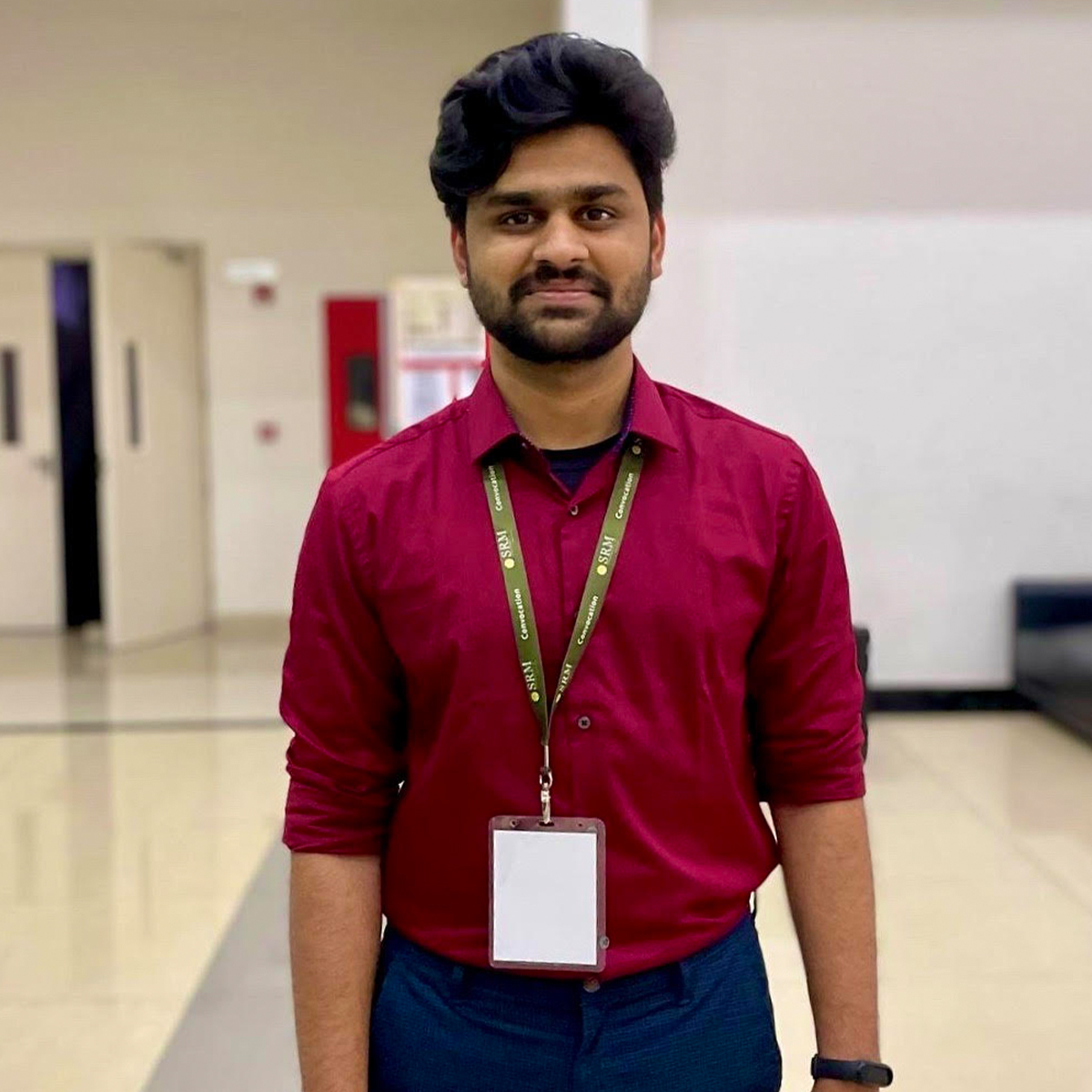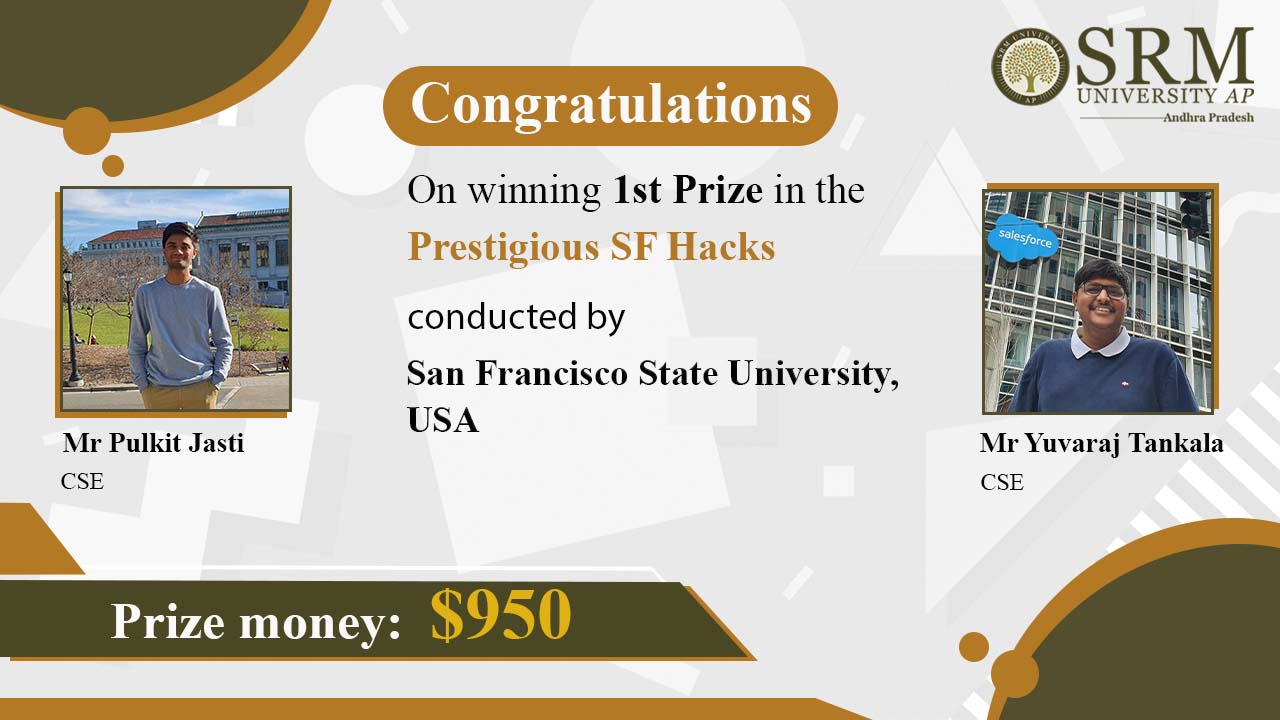All Management News
- WHO recognises research article on pandemic detection model March 25, 2022
The healthcare system across the globe has been under colossal pressure since the emergence of novel coronavirus pandemic. The pandemic has also unveiled some of the greatest gaps in the existing healthcare systems. The research paper authored by Dr Ashok Kumar Pradhan and his PhD student E Bhaskara Santhosh, Department of Computer Science and Engineering, proposing a blockchain-based pandemic detection model was recognised by WHO and the paper was listed in COVID-19 Global literature on coronavirus disease. The paper titled “iBlock: An Intelligent Decentralised Blockchain-based Pandemic Detection and Assisting System” was published in collaboration with Saraju Mohanty, University of North Texas and Dr Venkata Ramana Badarla, Associate Professor, IIT Tirupati. The authors have expressed their deepest gratitude to Science and Engineering Research Board (SERB) for Grant number TAR/2019/000286 and SRM University-AP for supporting this work.
Abstract of the Research
The recent COVID-19 outbreak highlighted the requirement for a more sophisticated healthcare system and real-time data analytics in the pandemic mitigation process. Moreover, real-time data plays a crucial role in detection and alerting process. Combining smart healthcare systems with accurate real-time information about medical service availability, vaccination, and how the pandemic is spreading can directly affect the quality of life and economy. The existing architecture models become inadequate in handling the pandemic mitigation process in a real-time dataset. This is because, the present models are server-centric and controlled by a single party, hence to manage confidentiality, integrity, and availability (CIA) of dataset is a challenging task. Therefore, a decentralised user-centric model is essential, where the CIA of user data can be assured. In this paper, we have suggested a decentralized blockchain-based pandemic detection and assistance system named as (iBlock) that uses robust technologies like hybrid computing and IPFS to support system functionality. Moreover, a pseudo-anonymous personal identity is suggested using H-PCS and cryptography for anonymous data sharing. The distributed data management module guarantees data CIA, security, and privacy using cryptography mechanisms. Furthermore, it delivers useful intelligent information in the form of suggestions and alerts to assist the users. Finally, the iBlock reduces stress on healthcare infrastructure and workers by providing accurate predictions and early warnings using AI/ML technology.
Contributions of the Research
i) Proposes a novel architecture model for pandemic detection and alertness using a blockchain called as “iBlock”. It supports sharing of real-time data utilization.
ii) The proposed system introduces suitable privacy and security mechanisms to cover system-level data privacy and security.
iii) It also suggests a logical combination of blockchain and AI/ML on hybrid computing to support global level requirements during pandemic mitigation and alerting the systems.Social Implications
The proposed system helps in the early detection of Covid-19 and encourages people to use their health data anonymously in pandemic detection and mitigation process. Moreover, iBlock maintains all crucial data on blockchain for future sustainable healthcare solutions. The majority of pandemic detection and alerting systems are limited to prediction, however iBlock further simplifies the area-labelling to cover area wise mitigation mechanisms. The classification of areas helps the government and healthcare organizations to plan sustainable preventive measures in a real-time scenario. It also helps in prediction of new cases and death rates with the aid of a dedicated AI/ML detection engine module. To motivate the people to share legitimate data, the proposed model even suggests a reward mechanism to influence the participants.
The research investigates the advanced possibilities in smart healthcare architecture to bring down the time and effort for pandemic mitigation activities. Read to know more.
- Journey of BSc Integrative Biology student to QS ranked universities March 25, 2022
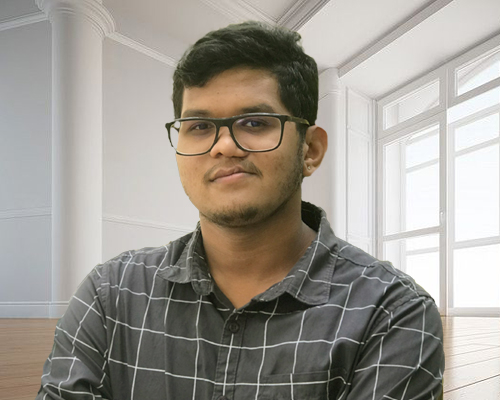 Our bright young minds bring fame and glory to the university from all around the world. Mr Haseesh Rahithya Nandam, from the final year of BSc (Hons) Integrative Biology, has received admission offers to MSc Infection and Immunity course, University College London (QS ranking 8) and MSc Medical and Molecular Virology, The University of Manchester (QS ranking 27).
Our bright young minds bring fame and glory to the university from all around the world. Mr Haseesh Rahithya Nandam, from the final year of BSc (Hons) Integrative Biology, has received admission offers to MSc Infection and Immunity course, University College London (QS ranking 8) and MSc Medical and Molecular Virology, The University of Manchester (QS ranking 27).UCL is rated the top university in the UK for research strength in the most recent Research Excellence Framework. The MSc course that Mr Haseesh has enrolled in primarily focuses on teaching concepts of infection and immunity. It contains course modules such as Molecular Virology, Evolution of Diseases, and Epidemiology.
“I am excited and happy since UCL stands in 8th rank and offers a course I dearly love to study”, says Mr Haseesh. According to him, the selection process for University College London was a piece of cake. The admission requirements were the English language proficiency test (IELTS/TOEFL) result, SoP, LoRs, CV, and Grade Card. He has also applied to Imperial College London and is waiting for the admission announcement.
SRM University-AP enables students to become the best version of themselves every single day and work towards their goals. “I am grateful for the support of my professor Dr Sutharsan Govindarajan to work in his lab. There, I got the opportunity to gain experience and learn new things”, says Mr Haseesh. He further thanked the Head of the Department, Prof Jayaseelan Murugaiyan, for his relentless guidance and support.
Continue reading → - Varying impact of health expenditure in Southeast Asia March 24, 2022
Health expenditure assumed enormous importance with the outset of coronavirus pandemic. The disparity between public and private health expenditure will often reflect in the health outcome of any nation. Through the research paper titled ‘The dynamics of public and private health expenditure on health outcome in Southeast Asia’ published in the journal Health and Social Care in the Community, Dr Shailender Singh, Associate Professor, Department of Commerce, attempts to argue that public expenditure on health has a substantial impact over private spending across the countries of ASEA.
Abstract of the Research
This study examines the dynamics of public and private health expenditure on health outcomes in Southeast Asia, vis-a-vis two of the Sustainable Development Goals (SDGs). The techniques of fixed effect, random effect, and feasible generalized least square methods are employed to obtain robust estimates. Further, the analysis dives deep into the country-specific impact of public and private health expenditure on health outcomes using the technique of seemingly unrelated regression. Estimates show that, across Southeast Asia, public health expenditure alone contributes to improving life expectancy at birth, lower levels of under-five, and non-communicable disease mortality rates. Unlike public health expenditure, private health expenditure contributes to better health outcomes only in Brunei and Singapore but not across the countries of Southeast Asia.
The paper asserts that, despite the statistical significance of private health spending with respect to the health outcomes, it does not contribute to lower mortality rate (MR) and higher life expectancy at birth. The results strongly support several prior pieces of evidence in the literature regarding health expenditure and health outcomes. The country-specific estimates show that public health spending contributes greatly to lower mortality rate, particularly in Brunei and Singapore. By contrast, private health spending does not contribute to lower levels of U5MR and NCD mortality rate across the countries of ASEA except in Cambodia, Indonesia, and Philippines.
The differences in economic development and the settings of health systems in these countries could be a plausible reason for the inability of private health expenditure to contribute to lower levels of NCD mortality rate in most of these countries. The result implies that more funding to the public health system has the potential to lower U5MR and NCD MR close to the SDGs target across the countries of ASEA. Also, strengthening the health system through providing greater access to preventive services for diabetes, hypertension, respiratory diseases, and cancers at primary care units may help in better diagnosis and management of these chronic conditions in Indonesia, Laos, and Myanmar where NCD MR is relatively high. However, an increase in funding alone may not be sufficient at improving health outcomes. For emerging conditions, diet modification, active physical exercise, little tobacco and alcohol consumption are also imperative.
The research is reported to be the first of its kind that examines the dynamics of public and private health expenditure on health outcomes in line with the SDGs targets. Apart from the traditional indicators commonly used as health outcomes in the literature (life expectancy and U5MR), the study further extends the literature by introducing NCD MR as an additional health outcome which could play a pivotal role in providing empirical evidence to the health policymakers and researchers.
Health plays an important role in promoting human capital and the economic growth of a country. The available stock of human capital in a country determines the rate of growth in its per capita income. A healthy individual contributes more to their economy by allocating more hours to work, earning more disposable income, in turn investing more in human development.
As the individual stock of health tends to diminish over time, there is a need to augment it by making more investment in time, income, and regular medical care. Thus, this research work has a societal benefit for the population of Southeast Asia to identify the threats in the field of health and focus more on their well-being for improving the state of health. Dr Singh conducted this research in collaboration with Dr Nishant Kumar, Amity University, Noida.
In future, he also intends to analyse the impact of socioeconomic and behavioural health determinants on the health system efficiency of the Middle East region, and to predict the key drivers for health care expenditure growth in the Middle East region through Grossman-PLS Modeling Approach.
- Metamaterials and their applications: Distinguished Lecture Series March 23, 2022
The Department of Electronics and Communication Engineering is hosting the first segment of the ECE Department Distinguished Lecture Series on March 24, 2022, from 12.00 pm to 01.00 pm IST. Prof Achanta Venugopal, Director, CSIR-NPL is the distinguished speaker of the event. He will be delivering a talk on the topic “Metamaterials and their Applications”.
Abstract of the Talk
Metamaterials are designed materials with unique properties that may not exist in naturally available materials. These are designed with sub-wavelength size components. In this talk, after briefly introducing metamaterials, the speaker will discuss on a few metal-dielectric and all dielectric metamaterials and their applications in wide-ranging areas covering stealth, single-photon emitters, reusable biosensors among others.
Speaker’s Profile
Venu Gopal Achanta obtained his PhD in Physics from Tata Institute of Fundamental Research, Mumbai and PhD in Electronics from Tokyo University, Tokyo, Japan. He is currently the Director of CSIR-National Physical Laboratory, Delhi. He is on lien from Tata Institute of Fundamental Research, Mumbai where he is a professor in the Department of Condensed Matter Physics and Material Science. He has served in various TIFR committees as chair and member. He is also on the senates of IISER, Berhampur and IIT, Delhi. He is a member of the executive council of Optical Society of India, vice-chair of IEEE Photonics Mumbai chapter and member of the program committee of the Association of Asia Pacific Physics Societies – Division of Condensed Matter Physics. He is on the editorial board of journals, Scientific Reports, Frontiers in Physics, Encyclopedia of Applied Physics, and the Indian Journal of Pure and Applied Physics. He is an honorary Fellow of the Metrology Society of India and senior member of IEEE. His research interests are in nano and quantum photonics with over 140 journal publications.
Join here for an insightful session with Prof Achanta Venugopal.
- Orientation: International internship and immersion programmes-II March 23, 2022
With so many options, students are frequently puzzled when selecting a course, studying its scopes, and aligning themselves with the prerequisites for going abroad.
A webinar series on International Internship & Immersion Programmes is being organised by the Office of International Relations and Higher Studies at SRM University-AP. Interested students can gain a detailed overview of international programmes and their preparation procedures.
Date: March 24, 2022. Time: 8.00 pm
Join the second episode of this illuminating series and get one step closer to your ambition of studying abroad!
Continue reading → - Dr Johannes Kirscher March 22, 2022
- CSE students bagged 2nd prize at I-Wallet design competition organised by IIT Bombay March 22, 2022
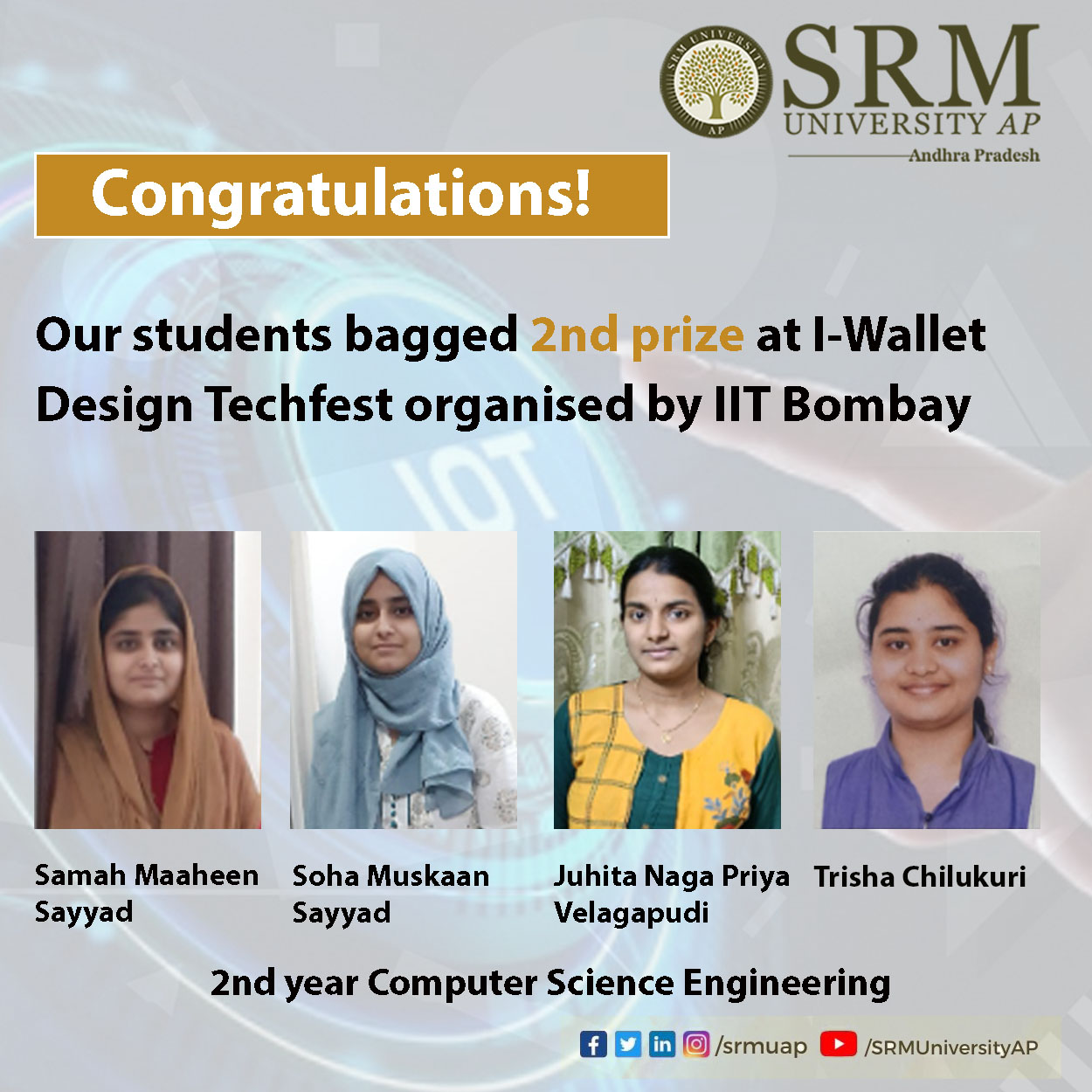 Soha Muskaan Sayyad, Samah Maaheen Sayyad, Juhita Naga Priya Velagapudi, and Trisha Chilukuri from 2nd-year Computer Science Engineering have achieved 2nd place in the I-Wallet Design Techfest, organised by IIT Bombay. Dr Sonam Maurya, Assistant Professor, Department of Computer Science and Engineering, guided the students to achieve this incredible feat.
Soha Muskaan Sayyad, Samah Maaheen Sayyad, Juhita Naga Priya Velagapudi, and Trisha Chilukuri from 2nd-year Computer Science Engineering have achieved 2nd place in the I-Wallet Design Techfest, organised by IIT Bombay. Dr Sonam Maurya, Assistant Professor, Department of Computer Science and Engineering, guided the students to achieve this incredible feat.The students started their work in December and explored a lot about IoT while working on it. More than 100 teams participated in this competition. In January, ten teams got selected for the second round, i.e., Report Submission, and our students were one of them. In February, based on the reports submitted, six teams, including our students, were selected for the final round, i.e., to present the proposed idea to the judges’ panel. Finally, the students bagged second place in the competition with cumulative prize money of INR 90,000.
Regarding the I-Wallet, students say that “Smart Wallet is an easy-to-use wallet that is designed for providing secured transactions”. It has minimal energy consumption, more security, and a few advanced features, some of which are not included in the regularly used wallets. The advanced IoT features enable it to be kept in our pockets with smartphones and smartwatches. The design received recognition from the expert panel members based on these features.
The team has also initiated the process to file a patent on the design of wallet. Students expressed their gratitude to Dr Sonam Maurya, Assistant Professor, Computer Science and Engineering, for her relentless guidance and continuous support towards the project. They also thanked SRM University-AP for providing the opportunity to participate in this national level competition organised by IIT Bombay.
Prof B V Babu, Dean, School of Engineering and Sciences, appreciated the students and their faculty mentors. “Keep up the good work, continue to excel in all your future endeavours at professional and personal levels and bring laurels to your alma mater”, he said in the congratulatory message.
Continue reading → - Paper presentation in International Conference on Innovations in Information Technology March 22, 2022
Mr Mudigonda Himansh, a 3rd-year BTech-CSE student, has presented a research paper in the IEEE International Conference on Innovations in Information Technology-2022 organised by IIIT Kottayam, Kerala India, in Feb-2022. The paper will be published in IEEE Xplore (Scopus indexed). Dr V M Manikandan, Assistant Professor in Computer Science and Engineering at SRM University-AP, is the co-author of the presented paper titled “A Statistical Study and Analysis to Identify the Importance of Open-source Software”.
Open-source software has picked up pace in the past decade with support from multinational conglomerates and huge open-source communities. We hear a lot about the success of many open-source projects, but we fail to understand how many do not make it. In this paper, Mr Himansh and Dr Manikandan understand the dynamics behind open-source software. They start with the need for open-source alternatives. Then look at a few concerns open-source software developers and maintainers face. Next, we would understand the various requirements of open-source software. Later, we would touch upon the different attributes that affect the selection of open-source software and the decisions to make while building general-purpose, open-source software. Then we would analyse the 5-determinants of open-source software success. Finally, we would look at the data collected from 482 data points from 24 countries and then analyse the data by forming graphs and charts.
This research provides the required knowledge to the open-source and non-open source software developers before-during-after development and production of the software or project. “Our future work is focused on the applications and predicting the scalability of large-scale OSS with machine learning,” says Dr Manikandan.
Continue reading → - Students pursuing semester abroad topped SF Hacks March 22, 2022
SRM University-AP is indeed proud of its young and intelligent minds who continue to bring honour and glory to the institution from across the globe. Pulkit Jasti and Tankala Yuvaraj, two of our students from the Department of Computer Science Engineering currently pursuing Semester Abroad Programme at the University of California, Berkeley have won first prize in the prestigious SF Hacks conducted by San Francisco State University, USA, and bagged a total of $950 ($600 for 1st Prize, $250 for Best UI/UX Design, and $100 for Best AIML Hack).
The world has always been ruled and sustained by ideas. Innovating and executing the unthinkable are what helped us tide over the unprecedented hardships the pandemic entailed. SF Hacks 2022, San Francisco’s largest collegiate hackathon was conceived to hatch some striking ideas under the tracks: inclusivity, mental health, sustainability, and machine learning to put the latest technologies to use in the fittest way possible to render solutions to the unending maladies of corona and climate change.
Pulkit Jasti and Tankala Yuvaraj have tread out of the way to introduce an AI-based classroom system that monitors the mental-well being of the students. It is an unfortunate fact that our classrooms have often overlooked the emotional and mental well-being of the students. The transition to virtual mode has made the scenario even worse. Researches state that the depression rates in students between ages 10-18 have increased by 72% since the pandemic.
According to Pulkit and Yuvaraj, this incredible innovation monitors various parameters like facial expressions, voice, attentiveness of a student during the class and generates a meta score that gives an overall idea about the mental well-being of the student. Based on this score, the school counsellors will be notified and then the student can have a one on one therapy session with the counsellor. This system can help identify signs of depression at early stages which makes classroom a safe learning environment for students.
They were determined to come up with an effective solution to redefine the conventional classroom setup and make learning a wholesome experience. “After selecting a problem and drafting the base of the project, we were assured that it could create a positive impact for students during these unprecedented times of the Covid-19 outbreak”, they said.
“During the hackathon, we ran into a lot of technical issues and roadblocks but were able to overcome them and submit our final prototype. To be a part of such a huge event where there were around 1000+ participants from over 26 countries was indeed a remarkable learning experience”, they expressed their feeling of contentment. “We can never thank enough our faculty at SRM for their enormous support throughout our journey at the University of California Berkeley” they added.
- Highly efficient catalysts of Ruthenium clusters on Fe3O4/MWCNTs for hydrogen evolution reaction March 22, 2022
“Highly Efficient Catalysts of Ruthenium Clusters on Fe3O4/MWCNTs for Hydrogen Evolution Reaction” is the latest paper published by Prof Ranjit Thapa, Professor of Physics at SRM university-AP and his PhD scholar, Mr Samadhan Kapse, in ‘New Journal of Chemistry’ having an Impact Factor of 3.591.
In this work, the chemical co-precipitation technique is adopted to produce Fe3O4 nanoparticles under an inert atmosphere and was utilized for HER studies. The Ru nanoparticles were profitably deposited over Fe3O4/MWCNTs GC electrode using electrochemical deposition technique. The superior HER activity was achieved on Ru/Fe3O4/MWCNTs in 0.1 M H2SO4 aqueous media. We have demonstrated that the synthesized electrocatalyst offers a low overpotential of 101 mV to achieve a current density of 10 mA cm-2 towards the hydrogen evolution reaction. It displays long-term durability, exceptional cyclic stability even after 1000 cycles. DFT calculations imply that the availability of both octahedral and tetrahedral sites in Ru/Fe3O4/MWCNTs with low overpotential is more efficient towards HER. It is emphasized that a low percentage of ruthenium in the prepared catalyst can be substituted as a promising HER catalyst for sustainable energy technologies.
Abstract of the paper
Producing molecular hydrogen (H2) using water provides a sustainable approach for developing clean energy technologies. Herein, we report highly active ruthenium clusters (Ru) supported on iron oxide (Ru/Fe3O4) and Fe3O4/multi-walled carbon nanotubes (Ru/Fe3O4/MWCNTs) by simple electrochemical deposition in a neutral aqueous medium. The supported catalyst exhibits good hydrogen evolution reaction activity (HER) in an acidic environment. Cyclic voltammograms (CV) in potassium ferrocyanide (K4[Fe(CN)6]) confirm MWCNTs enhance the electron transfer process by decreasing the redox formal potential. The overpotential of Ru/Fe3O4/MWCNTs and Ru/Fe3O4 electrocatalysts versus reversible hydrogen electrode (RHE) was found to be 101 mV and 306 mV to reach a current density of 10 mA cm-2 . As prepared, the catalyst displays good stability and retain its HER activity even after 1000 cycles. Further, the stability of Ru/Fe3O4/MWCNTs was studied using chronopotentiometric (CP) technique for 12 hrs and found negligible loss in the catalytic activity towards HER. To explore the role of Ru and underneath MWCNTs to improve the catalytic performance of Fe3O4, density functional theory (DFT) calculations were carried out. DFT calculations indicate the octahedral site of Ru/Fe3O4 favours HER with low overpotential. However, Ru/Fe3O4/MWCNTs is more efficient towards HER could be due to the availability of both octahedral and tetrahedral catalytic sites.
Social implications of the research
Renewable energy generation is of greater importance in the present circumstances. This is caused by the depletion of non-renewable energy sources like fossil fuels and other hydrocarbon deposits and the release of greenhouse gases into the atmosphere. Hydrogen has gained considerable interest as an energy storage and energy carrier because of its high energy density (146kJ/g). Furthermore, its lightweight, profusion nature and the release of water during its combustion eliminate environmental pollution and thus contribute to defeating the global energy crisis. Also, hydrogen is an important and ideal energy source to develop fuel cells. A number of methods have been explored to generate molecular hydrogen. Among them, water electrolysis is a promising technology for generating high-purity hydrogen from water. An excellent electrocatalyst is obligatory to liberate hydrogen gas effectively from water. A higher HER activity is known to be obtained from platinum (Pt) and Pt-based catalysts. Given its high cost and low surplus, it limits expansion to the industrial scale. Over the few past decades, lots of efforts have been made by many research teams to find out alternative catalysts to substitute Pt electrodes.
The paper is published in collaboration with Shwetha Kolathur Ramachandra, Doddahalli Hanumantharayudu Nagaraju, and Shivanna Marappa; School of Applied Sciences, REVA University, Bangalore-560064, Karnataka, India. According to the research group, the density functional theory can boost the searching process of highly promising electrocatalysts for hydrogen evolution reactions in renewable energy generation.


